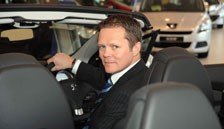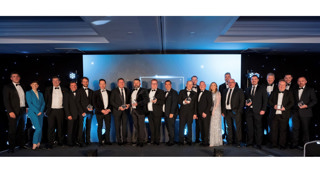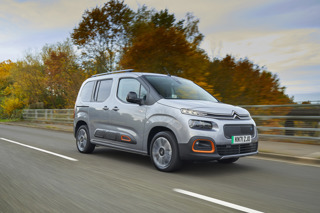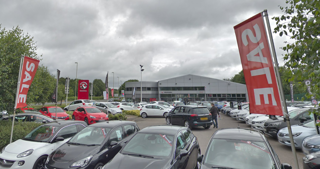By Maurice Glover
David Peel is the first to admit that it will take more than smarter operating processes, upgraded premises and a £30 million investment plan to steer a major British car business back to profit.
“Greater volume is the key – a little bit extra market share would make a world of difference,” said the man in charge of the UK and Ireland Peugeot Citroën Retail Group.
By Maurice Glover
David Peel is the first to admit that it will take more than smarter operating processes, upgraded premises and a £30 million investment plan to steer a major British car business back to profit.
“Greater volume is the key – a little bit extra market share would make a world of difference,” said the man in charge of the UK and Ireland Peugeot Citroën Retail Group.
But despite losing money for the greater part of a decade and ending 2010 more than £10m in the red, the company responsible for overseeing both PSA manufacturer-owned retailing channels is already on the right road to better balance sheets, he believes.
Peel, who ran Robins and Day before becoming chief executive of 50 Peugeot and Citroën dealerships two years ago, said: “We will return to operating at a profit by the end of 2015.
“We are retailing 45,000 new and 36,000 used cars a year and completing 750,000 workshop hours. As an enterprise with annual turnover in excess of £800m, this is a very important element in PSA’s business in the UK.
“With 38 sites compared with 220 dealerships, we’re accounting for around 28% of the total Peugeot dealer volume. And with 13 sites compared with 180 dealerships, we’re achieving 18% of Citroën car sales – so I’d say we certainly punch above our weight.”
So why has the group lost money over the last seven years? “Before I joined, the person in my position reported directly to the managing director of Peugeot UK and that meant he was obliged to take over failing dealerships and achieve the volumes that were set. Today, we operate as a totally separate business and I report into Paris. Our objective is to support the brands in metropolitan areas and I’m also required to make money. While our current results show a substantial loss, I can demonstrate to everybody that at all operational levels, we outperform all the regional groups and private capital dealers in the British Peugeot and Citroën networks.
“On the number of cars we sell per salesman, profit per unit and finance per unit, I can demonstrate that our profitability in new and used cars, profit per hour sold in the workshops, our workshop efficiencies and profit in parts are all ahead.
“My problem is that most of our operations are located in the high-cost areas where private capital businesses would not choose to be represented. As a result, my overheads are massive. At £50m a year before I start, they are absolutely massive and salary costs alone account for £3m a month.
“That leaves me between a rock and a hard place because we have 12 sites in central London and our strategy is to represent Peugeot in the top 13 metropolitan areas and Citroën in the top 10.”
Factfile: Peugeot Citroën Retail Group
Annual turnover: £800m
AM100 ranking: 10
Franchises: Citroen (13), Peugeot (38)
Annual sales volumes: 45,000 new, 38,000 used
Annual servicing: 750,000 hours annually
Peel recently opened a Robins and Day flagship site in Coventry after a £3m rebuild. Following modernisations and upgrades elsewhere that have cost £10m, he toasted approaching the halfway point in his plan to overhaul the group with a glass of champagne.
“Before I joined, there had been no investment in Robins and Day for 20 years, so I began from a low base. One-third of our sites still don’t reflect the latest corporate image, but they will be up to date by 2015.
Birmingham North has been modernised, I’ve just opened Preston and Stockport is to come shortly. Citroën will open in Birmingham and Coventry before the end of the year and we’ve acquired a new site in east London that will be developed into another flagship facility,” he said.
He’s particularly proud of the latest Coventry site, which was initially sketched out by Peel and the company’s six directors. It meets all the latest efficiency standards and boasts a new workshop flow arrangement based on ideas prompted by the Toyota lean production system.
“We piloted it at Birmingham North and it has doubled our efficiency by being minimal and easy to operate. The Coventry site has been designed to fully benefit from it. It’s already been described as the most efficient workshop by the official who came to accredit our MoT work.
“I’m particularly keen about efficiency here – every minute saved adds up to a considerable amount when you think about 10 technicians working for 220 days per year at a recovery rate of £60 per hour – so I have high hopes for the site, which caters for twice the number of used cars, has 50% more parking and is backed by bigger showroom and workshop space.”
At the end of his five-year plan, Peel wants to be leading the way: “I want us to be an industry example and I think the managing directors of both PSA brands in Britain should be able to show current and potential investors they have the best standards and operating practices. We should be the specialists in what we do and my ambition is to achieve that.
“The way to get there is via continuous development. Up to two years ago, all our sites had teams dealing with accounts, marketing and human resources. Today, they’ve all gone – every site now uses centralised operations and we have reduced headcount by two-thirds. Our operations team is very small and we’ve reduced our cost per unit as a result,” he says.
While he admitted much remains to be done regarding delivering upgraded premises, he insisted he is on track with his plans for people and processes, but cites profitability as his biggest challenge.
“Operationally, across up to 90% of the key performance indicators, we can show we’re better and in most cases in the top quartile, but that means we have less opportunity to be more efficient in the way we operate. We can always push our performance, but my cost is fixed, so to be profitable, we need to maintain our operational levels and sell more units.
“I need more throughput and for that I need help from both brands on market share. An increase of just 1% from each would make a huge difference. Both Peugeot and Citroën product lines have never been stronger and if the 208 meets our expectations, that in itself could add a percentage point.
“Peugeot has 5.1% market share and Citroën 4%, and if those figures were to increase to 7% and 5% respectively, our business would be at least £10m in profit. The signs are good – more than 3,000 orders have already been placed for the 208 – and we have lots of new product on the way, so I’m optimistic, even though we’re facing increasing competition.”
Click on page two to read the second part of AM's face to face interview with David Peel.
[page-break]Based at the new Peugeot Citroën headquarters in Coventry, the group is performing slightly better than last year and Peel claimed a recent head office reorganisation is improving internal efficiency levels.
“I think we’re probably as efficient as we can be, but we constantly challenge ourselves with regard to costs – we have to because the bills for utilities and fuel are constantly rising and our representation strategy means there’s just no way that we can replace big buildings in London with smaller premises.
“But the Peugeot Citroën Retail Group is a big machine and the shift from negative to positive is possible. As I say, additional volume is a key factor, but we need contributions from a number of areas and I believe people can also play a vital role in our plans for growth,” he said.
The belief that each of the 1,850 staff he employs should strive to treat customers as family members has prompted Peel to launch a programme that requires every new employee – from car cleaner to general manager – to attend company headquarters for an induction day held each month. There, they learn about the history of each brand and its ambitions in the marketplace before having individual discussion sessions with him or his directors.
“These last for 15 minutes and are deliberately staged on a face-to-face basis so we can get each new staff member to understand our rationale, see our vision for the future, explain what we’re aiming for in customer satisfaction and appreciate how we expect them to behave each time they meet a customer.
“I don’t come face-to-face with customers, so I need people to represent me on a daily basis. My aim is to show everybody that we’re ordinary, real people who have all come up through the ranks and are not asking them to do anything we’ve not done ourselves. It’s a challenge but the message is getting across and – significantly - our CSI ratings are on the increase,” he said.
Such is the desire to get staff ‘on message’, Peel records a 10-minute video each quarter to underline the fact that they are the group’s sole contact with customers and the importance of treating them in the correct way.
Management at individual outlets are no longer allowed to recruit staff. Instead, the group holds regional recruitment events and takes a particular interest in candidates who are new to the retailing industry.
“I’ve always believed that people who are good at motor retailing tend to stay where they are so I’m not interested in running the risk of inheriting any bad habits gained in previous employment. I’d much rather take on somebody who displays enthusiasm and a bit of personality.
“We need to recruit the right people and I’m very serious about having females in our sales and frontline teams. I’m spending a lot of time investing in our people to deliver the service I believe is essential,” he said.
After a survey showed that repair work was being delayed by lack of parts, sweeping changes have been made to stocking systems and parts are now being ordered in advance for specific service work.
“This change to ordering parameters means we are pro-viding a better service while also carrying 50% less stock and smart operation means we’re replenishing on a daily basis.
“We’ve also started to change the allocation of work in our service bays. Pre-delivery jobs go through one ramp on a continual basis and services are equally predictable, so they are supplied by pre-picked parts. Now we’re starting to have other ramps to deal with non-predictable work that attracts bonus payments, so the technicians are as happy as customers that we’re reaching right first time results. My hope is to apply this across the group, but it is taking time.
“In the more immediate future, I just wish the Government would put a more positive spin on consumer confidence – the negative spin we’re getting at the moment is making life more difficult for everyone.”
Login to continue reading
Or register with AM-online to keep up to date with the latest UK automotive retail industry news and insight.




















Archie - 10/12/2012 17:11
45,000 new,38,000 used and 750k hours and they lose money! Replace all senior managers immediately and recruit from Inchcape....job done.